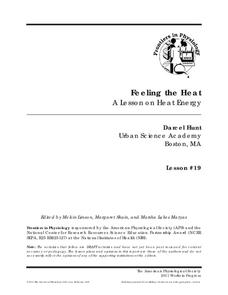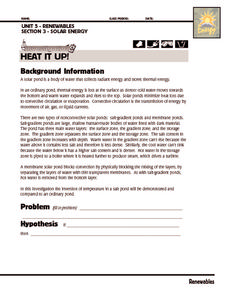Texas State Energy Conservation Office
Nuts! Calculating Thermal Efficiency
Oh nuts! Do macadamias or almonds produce more thermal energy? Energy enthusiasts find out with this experiment. The objective is to demonstrate to your class how the chemical energy contained in foods can be converted into useable...
American Physiological Society
Feeling the Heat
How do the changing seasons affect the homes where we live? This question is at the forefront of engineering and design projects. Challenge your physical science class to step into the role of an architect to build a model home capable...
Texas State Energy Conservation Office
Investigation: Building a Parabolic-Trough Collector
Amateurs of alternative energy build a mini parabolic-trough solar energy collector and use it to heat water. Temperature is recorded over a three-minute period and the data is graphed and analyzed. Note that in order to paint aquarium...
Texas State Energy Conservation Office
Investigation: Heat it Up!
This demonstration of solar ponds can be used in an earth, environmental, or physical science setting. Lab groups set up a solar pond and model how it is able, due to a salt concentration gradient, to maintain heat for future use.
Curated OER
Food Energy
In this food energy learning exercise, students review calories and how calories are determined. Students calculate how much thermal energy it would take to raise certain volumes of water a certain number of degrees. This learning...
Curated OER
More on Conduction and Convection
Why do some items feel colder when they are the same temperature? How should you keep your soda cold? What makes the wind blow? These are just some of the things middle schoolers discover when completing a lesson on conduction and...
Curated OER
Thermochemistry
In this thermochemistry worksheet, students answer 6 questions about specific heat, heat capacity and molar heat capacity. They also complete a crossword puzzle given 20 clues about topics related to thermochemistry. Students solve a...
Curated OER
Hess's Law
In this reactions worksheet, students use Hess's Law to calculate the heat gained or lost by different reactions. Students determine if the reaction would occur spontaneously at a given temperature. This worksheet has 9 problems to solve.









